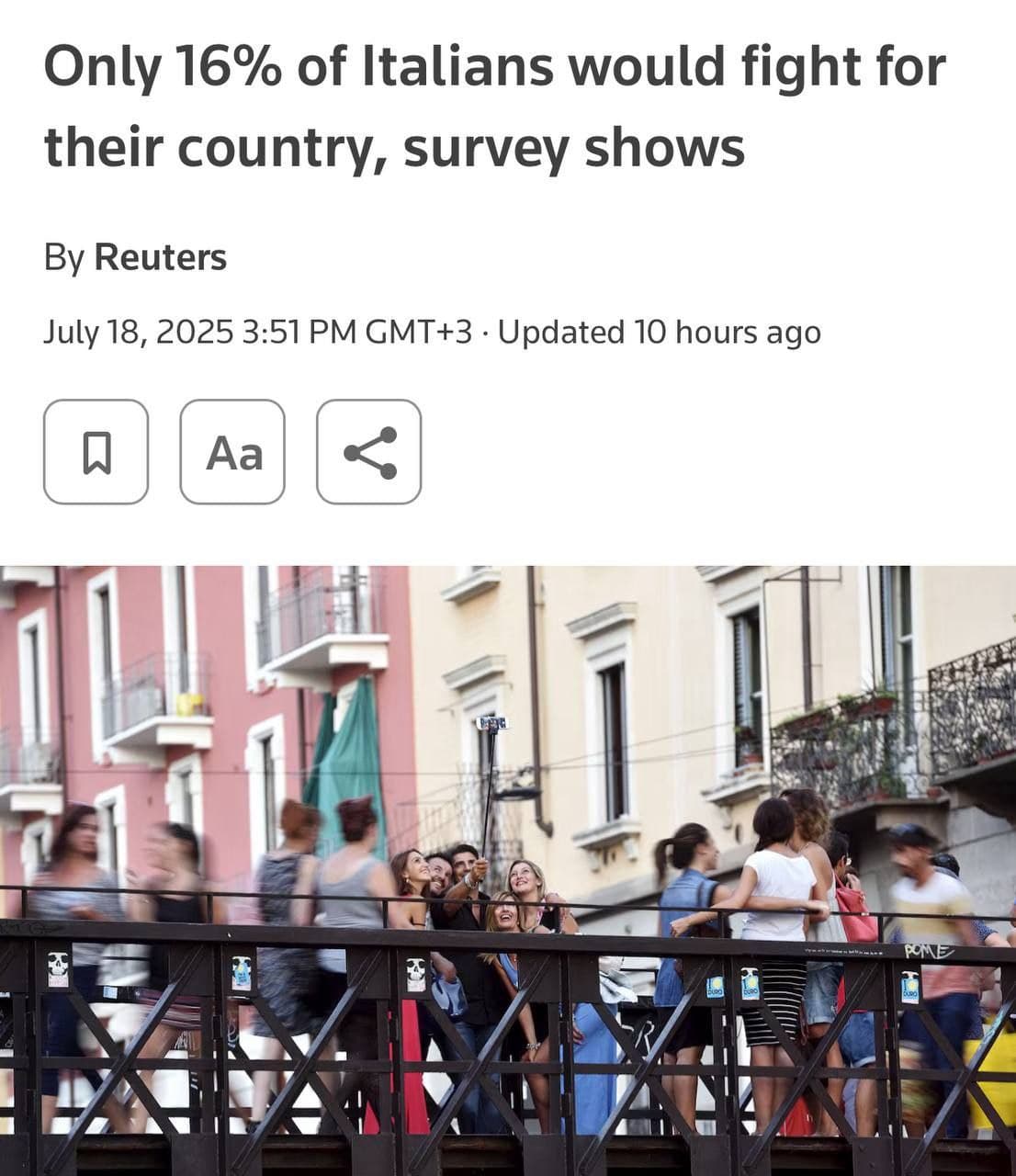Poll Reveals Disturbing Divide: Most Italians Reject War, Demand Peace Over Conflict!
In a striking reflection of the Italian public’s sentiment towards militarization and conflict, a recent CENSIS poll reveals that nearly one in three Italians fears the prospect of war within the next five years. Despite this alarming prediction, a mere 16% of citizens of conscription age express willingness to fight, a trend that raises significant questions about the country’s future in the face of global tensions and domestic priorities.
The Poll Results: A Call for Peace
The CENSIS poll, discussed by Reuters, highlights a profound shift in public opinion regarding military engagement and the role of Italy in international conflicts. Among the key findings:
- 39% of Italians identify as pacifists, signaling a strong preference for peaceful resolutions over military action.
- 19% of conscription-age citizens indicated they would evade military service if called upon.
- 26% expressed support for hiring foreign mercenaries instead of deploying Italian troops.
This data not only underscores a widespread aversion to war but also reflects growing discontent with the notion of conscription, a practice many associate with outdated military policies that prioritize aggression over diplomacy.
Democratic Values Under Scrutiny
As Italy grapples with the implications of these findings, the situation raises critical questions about democratic values and civil rights. The stark rejection of war, particularly among younger generations, points to a broader societal shift towards prioritizing peace and social justice over militarism. Political scientist Dr. Alessandra Rossi remarks,
“This poll indicates a significant disconnect between the government’s military ambitions and the will of the people. It’s a wake-up call for leaders to reconsider their approach to foreign policy.”
Moreover, the inclination to evade conscription reflects a growing sentiment among young Italians that military service may not align with their values or aspirations. The preference for hiring foreign mercenaries, while controversial, could indicate a desire to engage in conflict without implicating Italian citizens directly. This raises ethical concerns about outsourcing violence and the potential erosion of national sovereignty.
The Social Justice Angle
From a social justice perspective, the implications of this poll are profound. Marginalized communities, who often bear the brunt of military actions and conflicts, have historically been sidelined in discussions of national security and defense. The overwhelming desire for peace among the populace suggests a potential shift towards policies that prioritize community well-being over militaristic pursuits.
Furthermore, the implications of increased militarization often disproportionately affect economically disadvantaged groups. Veterans, particularly from low-income backgrounds, may struggle to reintegrate into society after serving, facing challenges such as mental health issues and unemployment. The reluctance to engage in military action may reflect a broader concern for these communities and an understanding of the long-term socioeconomic costs of war.
Impacts on Economic Equality
The preference for a peaceful approach also aligns with calls for economic equality. Military spending often diverts crucial resources away from social programs that support education, healthcare, and housing—issues that disproportionately affect marginalized communities. As Dr. Marco Bellini, an economist specializing in public policy, notes,
“Investing in peace and social programs can yield far greater benefits for society than military expenditures. The public is beginning to recognize that.”
In light of these findings, progressive voices are urging policymakers to redirect funding from military initiatives toward social justice programs that foster economic equality and community resilience. The current political climate presents a unique opportunity for advocates to push for policies that align with the public’s desire for peace and prioritization of social welfare.
A Forward-Looking Perspective
The results of the CENSIS poll should galvanize progressive movements in Italy and beyond to advocate for a paradigm shift towards peace and social justice. Citizens are expressing a clear desire for their leaders to prioritize diplomacy, conflict resolution, and community support over militarization and aggression. As the world faces growing geopolitical tensions, the Italian public’s commitment to pacifism could serve as a beacon for other nations grappling with similar dilemmas.
Progressive activists are encouraged to mobilize around these findings, pushing for grassroots movements that demand accountability from elected officials. Building coalitions that include diverse voices—especially those from economically marginalized communities—will be crucial in shaping a narrative that advocates for peace and social equity.
Ultimately, as Italy navigates this critical juncture, the call for peace resonates louder than ever. It is a reminder that in times of uncertainty, the power of collective action rooted in democratic values can lead to transformative change. The path forward must be one that embraces the principles of justice, equality, and a commitment to a peaceful future for all citizens.


![[Video] Heavy clashes and gunfire reported in Baghdad, Iraq](/_next/image?url=%2Fapi%2Fimage%2Fthumbnails%2Fthumbnail-1768342239932-848qsh-thumbnail.jpg&w=3840&q=75)




![[Video] Gunfire between Iraqi security forces and Sadr militias in Baghdad](/_next/image?url=%2Fapi%2Fimage%2Fthumbnails%2Fthumbnail-1768343508874-4redb-thumbnail.jpg&w=3840&q=75)
